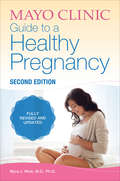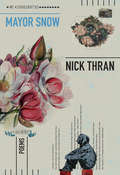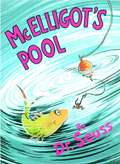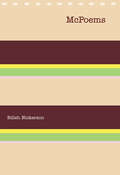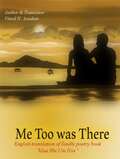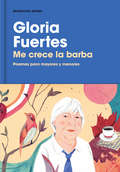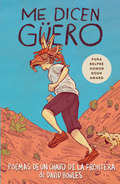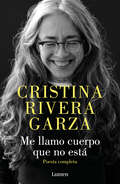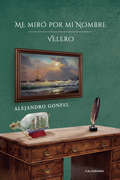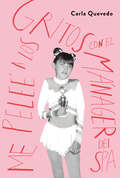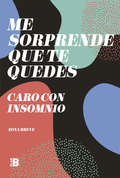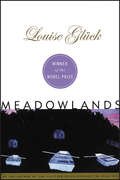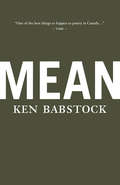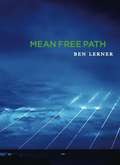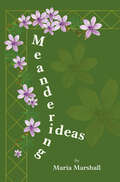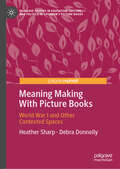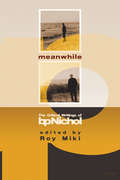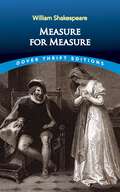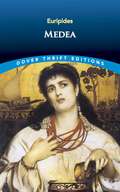- Table View
- List View
Mayo Clinic Guide to a Healthy Pregnancy
by Myra J. WickAn essential pregnancy resource for all parents-to-be. Mayo Clinic Guide to a Healthy Pregnancy, second edition is an authoritative, yet practical reference manual from the pregnancy experts at the #1 ranked hospital in America. The newly updated book includes information on everything from healthy lifestyle habits to the latest technologies in prenatal care and childbirth. Features include week-by-week updates on baby&’s growth, as well as month-by-month changes that mom can expect. In addition, you&’ll find a forty-week pregnancy calendar, an overview of common pregnancy symptoms, information on safe medicine use, tools to help parents with important pregnancy decisions, and general caregiving advice—information moms and dads can trust to help give their little ones a healthy start. Mayo Clinic Guide to a Healthy Pregnancy, second edition is the collective effort of a team of health care experts who find nothing in medicine more exciting and satisfying than the birth of a healthy child by a healthy mother. Any parent-to-be looking for accurate and authoritative information from a reliable source will surely appreciate this illustrated, easy-to-understand book.
Mayor Snow
by Nick ThranMayor Snow is about both the abdication and acceptances of responsibilities and inheritance: be they civic, personal, poetic. It begins with speaker-less evocations of corrupt and oppressive political atmospheres and ends with first-person narrative tales of domestic life in Al Purdy's refurbished A-frame. All of these poems work in a shadow, be they forebears, tabloids, cultural markers or government watchdogs.In the opening and closing sequences, narrative devices act as smokescreens to abstract illustrations of power, with the central sequence reflecting on the subject of dislocation. Parody and paradox are closely intertwined throughout, with the authority of power disrupted through dark humour, unexpected images and the deep resonances existing in apparently innocuous things: a well-worn (and literally "powerless") cabin, a baby daughter, a poem. The question of groundedness, whether literal, literary or familial, explores the terrain between the fearful and the familiar: "Go outside. / Listen to dogs howl. // How do we live / without power?"
McDougal Littell Literature (Indiana Grade 8 Edition)
by Mcdougal LittellMcDougal Littell Literature invites students to explore the world of art, literature, and life's big questions. Students analyze fiction, nonfiction, poetry, drama, and media across clusters of standards. Special features support visual and media literacy, along with research strategies.
McDougal, Littell English Literature: American Literature, Green Level
by Gail A. Dristle Luann W. GlickMcDougal, Littell Literature, Green Level, contains unadapted, uncut selections that represent the finest traditional and contemporary literature.
McElligot's Pool
by Dr SeussA young man dreams of all the fish that might just be coming to be caught in McElligot's pool, from whales, to dogfish, from catfish to eels. Let your imagination run wild in this delightful story.
McPoems
by Billeh NickersonBilleh Nickerson's first poetry book, The Asthmatic Glassblower, was shortlisted for the Publishing Triangle's Gay Men's Poetry Award. The hilarious and illuminating poems in his new collection, McPoems, are based on his years working at a particularly well-known fast-food restaurant; they paint a vivid picture of life behind the counter and will resonate with anyone who has ever held a fast-food job. Hold the pickle!Billeh Nickerson's other books include the essay collection Let Me Kiss It Better and Seminal: The Anthology of Canada's Gay Male Poets. He has taught poetry at Kwantlen University College (Vancouver) and Queen's University (Kingston, Ontario).
Mcdougal Littell Literature and Language: Ninth-Grade, Orange Level
by Jane N. BeattyAn anthology of fiction, non-fiction, poetry, drama, etc. The selections in this book represent some of the finest examples of unadapted traditional and contemporary literature. There are classics that have been read and enjoyed again and again, as well as exciting pieces that have never before appeared in a literature textbook. What you read will challenge your ways of thinking, illustrate the cultural and ethnic variety of your world, and relate to experiences in your own life.
Me Too Was There: English Translation of sindhi Poetry book “Maa Bhi Ute Hos”
by Vinod AsudaniFrom the author Vinod Asudani comes a fourth anthology of Sindhi Ghazals. Nothing is more valuable reward for the poet than the admiration of readers for his poetry. He would like to express my heartfelt gratitude to all those readers who have appreciated my poetry published in Chingu-Chingu (Sparks-2003), Bahi Jun Padhu (The Roots of Fire-2004) and Bhun-Bhun (Murmur-2012).
Me crece la barba: Poemas para mayores y menores
by Gloria FuertesUna amplia antología de la poesía de Gloria Fuertes para adultos y para niños, en el año de la conmemoración del centenario de su nacimiento. «Mi poesía está aquí, como nació -sin ningún ropaje de retórica-, descalza, desnuda, rebelde, sin disfraz. Mi poesía recuerda y se parece a mí.»Gloria Fuertes Cuando el mundo retrocede, la rima asoma. Cuando la vida aprieta, los versos repuntan. Así podría definirse el legado de Gloria Fuertes, poeta necesaria del amor, la injusticia, el anhelo y la soledad. Al cumplirse el centenario de su nacimiento, en pleno auge de la poesía en las redes, reivindicamos a una mujer única. En esta antología libre se reúne una amplia muestra de su producción poética para adultos, tan perenne como injustamente olvidada, y para niños, que le valió en las últimas décadas el clamor popular pero quizá no el crítico. Dispuestos y asociados en una suerte de itinerario vital (que no cronológico) de la autora, los poemas de Me crece la barba dan viva fe de que no había dos Glorias, sino una sola y para todos los públicos. Para absolutamente todos. Reseñas:«Pocas veces unos poemas tan particularmente despojados de preocupaciones de estilo me han producido una más penetrante sensación de originalidad estilística.»J.M. Caballero Bonald «La gran Gloria Fuertes, la poeta de la difícil facilidad, que tuvo lo más raro de tener para un escritor: nítida voz propia.»Luis Antonio de Villena «Sus versos son desconsolados y atroces, saludables y humanos, mortales de necesidad y amargamente sobrios y juguetones como el diablillo de la guardia, al que esta mujer quiere peinar los cuernos.»Camilo José Cela «Se sale de sus libros con una sorda alegría en el cuerpo, una sensación de contenida felicidad, de sonrisa amable, no sé, de compañía.»Juan Bonilla
Me crece la barba: Poemas para mayores y menores
by Gloria FuertesUna amplia antología de la poesía de Gloria Fuertes para adultos y para niños, en el año de la conmemoración del centenario de su nacimiento. «Mi poesía está aquí, como nació -sin ningún ropaje de retórica-, descalza, desnuda, rebelde, sin disfraz. Mi poesía recuerda y se parece a mí.»Gloria Fuertes Cuando el mundo retrocede, la rima asoma. Cuando la vida aprieta, los versos repuntan. Así podría definirse el legado de Gloria Fuertes, poeta necesaria del amor, la injusticia, el anhelo y la soledad. Al cumplirse el centenario de su nacimiento, en pleno auge de la poesía en las redes, reivindicamos a una mujer única. En esta antología libre se reúne una amplia muestra de su producción poética para adultos, tan perenne como injustamente olvidada, y para niños, que le valió en las últimas décadas el clamor popular pero quizá no el crítico. Dispuestos y asociados en una suerte de itinerario vital (que no cronológico) de la autora, los poemas de Me crece la barba dan viva fe de que no había dos Glorias, sino una sola y para todos los públicos. Para absolutamente todos. Reseñas:«Pocas veces unos poemas tan particularmente despojados de preocupaciones de estilo me han producido una más penetrante sensación de originalidad estilística.»J.M. Caballero Bonald «La gran Gloria Fuertes, la poeta de la difícil facilidad, que tuvo lo más raro de tener para un escritor: nítida voz propia.»Luis Antonio de Villena «Sus versos son desconsolados y atroces, saludables y humanos, mortales de necesidad y amargamente sobrios y juguetones como el diablillo de la guardia, al que esta mujer quiere peinar los cuernos.»Camilo José Cela «Se sale de sus libros con una sorda alegría en el cuerpo, una sensación de contenida felicidad, de sonrisa amable, no sé, de compañía.»Juan Bonilla
Me dicen Güero
by David BowlesLa vida de un niño nacido en la frontera no es fácil, pero Güero sabe cómo hacerle frente: escribiendo poemas. Güero tiene doce años y es mexicano y americano al mismo tiempo. Sabe sentirse en casa en ambos lados del rio, y en su vida hay tanto español como inglés. Güero ha comenzado el séptimo año en la escuela, y su profe de inglés hace que hasta los poemas suenen cool. Güero es como llaman a los chicos como el: pálidos. Pero no te equivoques, nuestro héroe pelirrojo y con pecas es puro mexicano, como el Canelo Álvarez. Además, Güero es un nerdlector, gamer, músicoque se junta con una banda de inadaptados como el: Los Bobbys. Como todos los chicos de su edad, Los Bobbys se meten en problemas y, ¡hasta les gustan las chicas! Pero bueno, ¡cuidado con Joanna! Es dura como ninguna. De la mano de las tradiciones familiares, su acordeón y su escuadrón de nerds, Güero le hace frente al séptimo año escolar con inteligencia y un gran corazon.
Me dicen Güero: Poemas de un chavo de la frontera
by David BowlesLa vida de un niño nacido en la frontera no es fácil, pero Güero sabe cómo hacerle frente: escribiendo poemas. Güero tiene doce años y es mexicano y americano al mismo tiempo. Sabe sentirse en casa en ambos lados del rio, y en su vida hay tanto español como inglés. Güero ha comenzado el séptimo año en la escuela, y su profe de inglés hace que hasta los poemas suenen cool. Güero es como llaman a los chicos como el: pálidos. Pero no te equivoques, nuestro héroe pelirrojo y con pecas es puro mexicano, como el Canelo Álvarez. Además, Güero es un nerd—lector, gamer, músico—que se junta con una banda de inadaptados como el: Los Bobbys. Como todos los chicos de su edad, Los Bobbys se meten en problemas y, ¡hasta les gustan las chicas! Pero bueno, ¡cuidado con Joanna! Es dura como ninguna.De la mano de las tradiciones familiares, su acordeón y su escuadrón de nerds, Güero le hace frente al séptimo año escolar con inteligencia y un gran corazon.
Me llamo cuerpo que no está: Poesía completa
by Cristina Rivera GarzaLa poesía de Cristina Rivera Garza reunida por primera vez en un sólo volumen. «En los poemas de Cristina Rivera Garza hay sopas instantáneas, sillas de plástico color naranja, mandarinas desgajadas, batas de franela, lentejuelas, rímel y risas, una cajera cuando devuelve el cambio, papas fritas, té de menta o té de naranja o té de jazmín, Valium, dos cajas de Marlboro light, trescientas aspirinas, vasos de leche, flores de plástico, botes de basura, escritorios de metal, latas de sardinas, cables de teléfono, ambulancias, rocolas. También hay personajes como la Mujer Enorme, la Ex-durmiente,la Ex-Muerta, la Diabla, la Bestia, Los Sumergidos, los Desamparados y los Solos y los de Tres Corazones Bajo el Pecho. Además de algunas de las frases con las que suelen iniciar los cuentos infantiles —para sumergirnos en una suerte de ensoñación o enrarecimiento,propicios de la clase de historias que estamos a punto de leer—: Había una vez. O dos. Érase que se era. Érase que fue o que habría sido. La poesía de Cristina Rivera Garza es una carretera bífida: un camino que se bifurca entre la materialidad más tangible y rotunda y la posibilidad de lo contingente, de lo que podría o no suceder. Sus poemas son un lugar donde es viable que lo que es sea; pero, sobre todo, y como anhelaba Alejandra Pizarnik: que sea lo que no es.» Del prólogo de Sara Uribe.
Me miró por mi nombre: Velero
by Alejandro Gonfel¿Quién entre Markus, el pelotari, Évariste, Álvar, Ezio, o algún cierto alguien, es el único por el que se siente arraigo? ¿Quién es Él? Me miró por mi nombre y Velero conforman una antología poética, primordialmente erótica, que directa o indirectamente se puede resumir en que es una larga carta de amor, a través de poemas, a un solo y único hombre en las distintas etapas de la formación del poeta; y no la mera serie de devaneos que le puede parecer al lector. Ciertamente, se alternan a veces poemas con amoríos poéticos y, en otras, algunos a familiares o a lugares que al autor le son inmensamente entrañables, sentimientos estos que solo debieron haber sido destinados para Él. He escrito lo anterior porque cada vez que le he leído uno de mis poemas a algún curioso/a encantador/a, si no hay un indicio obvio, antes de emitirme su opinión, casi en general me han cuestionado indagatoriamente: «¿Y a quién se lo escribiste?». Siempre les hago ver que le restaría universalidad si mencionara el tan venerado y amadísimo nombre. Lo mismo te/le respondo a ti/usted. Solo Alonso Quijano tuvo la enternecedora locura de mencionar con tanta devoción y vehemencia a Dulcinea. Y yo, mucho me temo, también soy loco.
Me peleé a los gritos con el mánager del spa
by Carla QuevedoEstos poemas son la búsqueda de un lenguaje íntimo en un mundo lleno de palabras y de la imagen justa en un mundo lleno de imágenes. Decir te amo o tengo miedo en otro idioma es más fácil porque las palabras al ser ajenas pesan menos. A veces hay que irse muy lejos para encontrarse o adoptar otra lengua para animarse a describirse. Este libro se escribió entre Buenos Aires, Nueva York, Montevideo y Los Ángeles. Estas ciudades fueron a la vez la promesa de vidas posibles y la excusa para encontrar un idioma que explicara una forma de ser. Con sensibilidad y desapego, Carla Quevedo habla de la tristeza, la soledad, el amor y los perros, el desasosiego existencial disimulado en un feed de Instagram. Estos poemas son la búsqueda de un lenguaje íntimo en un mundo lleno de palabras y de la imagen justa en un mundo lleno de imágenes. La autora dice que la actuación y el idioma le permitieron explorar ser otra. La diferencia es que en los personajes se esconde y en el idioma se encuentra.
Me sorprende que te quedes: Caro con insomnio
by Carolina PeraltaEste es un libro de amor, sobre el amor, poemas escritos como regalos: le hablan al deslumbramiento que es enamorarse y también a la incertidumbre, esa pátina de nostalgia y desencanto sabio que la poeta bien utiliza con belleza para deslizar los miedos y las inseguridades. Son poemas felices, inspirados en la maravilla de conocer a alguien, y también salvajes, mezclados del dolor que produce la aventura de permanecer juntxs. "Escribir hace que quede ahí, que el sentir no se borre, que lo que pienso no se esfume. Que quede, que no se vaya. Porque yo tengo mucho miedo a que las cosas, las personas se vayan.Las personas a veces abandonan. Las palabras, la poesía, no.Por eso lo escribo, para que no me abandonen.Por eso escribo, para no abandonarme".
Meadowlands
by Louise GluckWinner of the Nobel Prize in LiteratureIn an astonishing book-length sequence, Pulitzer Prize-winning poet Louise Gluck interweaves the dissolution of a contemporary marriage with the story of The Odyssey.Here is Penelope stubbornly weaving, elevating the act of waiting into an act of will; here, too, is a worldly Circe, a divided Odysseus, and a shrewd adolescent Telemachus. Through these classical figures, Meadowlands explores such timeless themes as the endless negotiation of family life, the cruelty that intimacy enables, and the frustrating trivia of the everyday. Gluck discovers in contemporary life the same quandary that lies at the heart of The Odyssey: the "unanswerable/affliction of the human heart: how to divide/the world's beauty into acceptable/and unacceptable loves."
Mean
by Ken BabstockMean is a stunning exploration of the threshold and divide between our primeval origins and the meanness of our everyday lives. In this collection, the pastoral collides with the concrete terrain of motorbikes, prisons, and chainlink to capture our constructed isolation and our buried, yet resonant, connection to the land and seascapes that surround us. Ken Babstock's poetic voice is wholly original -- searing and pure in its realism, evocative and affecting in its search for a place to call its own. Mean won the Atlantic Poetry Prize (1999) and the Milton Acorn People's Poetry Award (1999).
Mean Free Path
by Ben Lerner"Lerner [is] among the most promising young poets now writing."--Publishers Weekly"Sharp, ambitious, and impressive." --Boston ReviewNational Book Award finalist Ben Lerner turns to science once again for his guiding metaphor. "Mean free path" is the average distance a particle travels before colliding with another particle. The poems in Lerner's third collection are full of layered collisions--repetitions, fragmentations, stutters, re-combinations--that track how language threatens to break up or change course under the emotional pressures of the utterance. And then there's the larger collision of love, and while Lerner questions whether love poems are even possible, he composes a gorgeous, symphonic, and complicated one.You startled me. I thought you were sleepingIn the traditional sense. I like lookingAt anything under glass, especiallyGlass. You called me. Like overheardDreams. I'm writing this one as a womanComfortable with failure. I promise I will neverBut the predicate withered. If you areUncomfortable seeing this as portraitureClose your eyes. No, you startledBen Lerner is the author of three books of poetry and was named a finalist for the National Book Award for his second book, Angle of Yaw. He holds degrees from Brown University, co-founded No: a journal of the arts, and teaches at the University of Pittsburgh.
Meandering Ideas
by Maria MarshallFollowing Maria Marshall’s A Child’s War, her memoir of family life during World War 2, this first collection of her poetry covers subjects ranging from the beauty of nature to mind-boggling discoveries about the universe, as well as places and events in Kilkenny City, where she and her late husband Peter lived for the last 20 years.
Meaning Making With Picture Books: World War I and Other Contested Spaces (Palgrave Studies in Education, Culture, and Politics in Children’s Picture Books)
by Heather Sharp Debra DonnellyThis book examines well-known poetry, picture books, and multimodal texts to explore how visual and literary texts shape collective memory and historical understanding with an initial focus on World War I before expanding to include more current contested issues topics such as colonialism, immigration, and First Nations&’ experiences. Organized into three sections, the book discusses the role of picture books in teaching difficult histories, analyses postmodern picture books addressing controversial topics, and provides a framework for classroom pedagogy. This approach highlights the importance of empathy, ethics, and creative expression in history education, showcasing how storytelling through multimodal texts bridges the past to the present.
Meanwhile
by Bp Nichol Roy MikiRepresenting a substantial collection of bpNichol's critical writing from the mid-1960s to the year of his death, 1988, Meanwhile puts him on the vanguard of Canadian literature and critical theory. This collection is essential to our sense of Nichol not only as a writer, but also as a person of exemplary generosity, imagination and intellectual range.
Measure for Measure: Unabridged (Dover Thrift Editions: Plays)
by William ShakespeareOne of Shakespeare's "dark comedies," Measure for Measure is as noteworthy for its fascinating political and social implications as for its compelling characters: a duke masquerading as a monk, a would-be nun ordered to sacrifice her chastity to save her brother's life, and a self-righteous courtier, professing his incorruptibility while concealing a depraved private life.In this engrossing drama set in 16th-century Vienna, Duke Vincentio attempts to enforce the city's long-ignored morality laws, which results in a death sentence for Claudio, a young man accused of seducing and impregnating his fiancée. Isabella, his sister, attempts to gain a pardon for him, but refuses when she is asked to exchange her virtue for her brother's life.Claudio eventually is freed and utter tragedy is averted, as Shakespeare explores with force and sensitivity the basis of good government, public and private morality, and the balancing of justice and mercy, among other themes.
Medea
by EuripidesOne of the most powerful and enduring of Greek tragedies, Medea centers on the myth of Jason, leader of the Argonauts, who has won the dragon-guarded treasure of the Golden Fleece with the help of the sorceress Medea. Having married Medea and fathered her two children, Jason abandons her for a more favorable match, never suspecting the terrible revenge she will take. Euripides' masterly portrayal of the motives fiercely driving Medea's pursuit of vengeance for her husband's insult and betrayal has held theater audiences spellbound for more than twenty centuries. Rex Warner's authoritative translation brings this great classic of world literature vividly to life.
